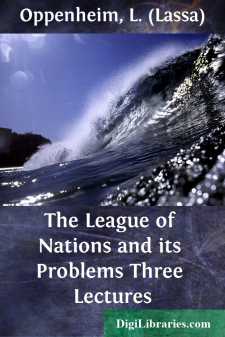Categories
- Antiques & Collectibles 13
- Architecture 36
- Art 48
- Bibles 22
- Biography & Autobiography 813
- Body, Mind & Spirit 142
- Business & Economics 28
- Children's Books 17
- Children's Fiction 14
- Computers 4
- Cooking 94
- Crafts & Hobbies 4
- Drama 346
- Education 46
- Family & Relationships 57
- Fiction 11829
- Games 19
- Gardening 17
- Health & Fitness 34
- History 1377
- House & Home 1
- Humor 147
- Juvenile Fiction 1873
- Juvenile Nonfiction 202
- Language Arts & Disciplines 88
- Law 16
- Literary Collections 686
- Literary Criticism 179
- Mathematics 13
- Medical 41
- Music 40
- Nature 179
- Non-Classifiable 1768
- Performing Arts 7
- Periodicals 1453
- Philosophy 64
- Photography 2
- Poetry 896
- Political Science 203
- Psychology 42
- Reference 154
- Religion 513
- Science 126
- Self-Help 84
- Social Science 81
- Sports & Recreation 34
- Study Aids 3
- Technology & Engineering 59
- Transportation 23
- Travel 463
- True Crime 29
L. (Lassa) Oppenheim
Lassa Oppenheim was a renowned German jurist and one of the founders of the modern field of international law. He is best known for his influential work "International Law: A Treatise," published in 1905, which remains a key reference in the study of international legal principles. Oppenheim advocated for a positivist approach to international law, focusing on state sovereignty and legal norms derived from state practice. His work had a significant impact on shaping international legal theory and practice in the 20th century.
Author's Books:
Sort by:
SECTION I 1. A Councillor of Legation in difficulties. In 1868 the French journalist Léonce Dupont, the owner of the Parisian newspaper La Nation, became bankrupt. It was discovered that this paper was really founded by the councillor of the Russian legation in Paris, Tchitchérine, who had supplied the funds necessary to start it, for the purpose of influencing public opinion in Russian interests....
more...
The Panama Canal conflict is due to the fact that the Governments of Great Britain and the United States do not agree upon the interpretation of Article III, No. 1, of the Hay-Pauncefote Treaty of September 18, 1901, which stipulates as follows:— "The Canal shall be free and open to the vessels of commerce and of war of all nations..., on terms of entire equality, so that there shall be no...
more...
In a note prepared in 1915 for the English edition, Professor Oppenheim stated the circumstances under which his tractate on The Future of International Law was undertaken and published. 'This little work,' he said, 'originally written in German, was first published in 1911, under the title Die Zukunft des Völkerrechts (Leipzig: W. Engelmann), as a contribution to the Festschrift...
more...
PREFACE The three lectures collected in this volume were prepared without any intention of publication. They were delivered for the purpose of drawing attention to the links which connect the proposal for a League of Nations with the past, to the difficulties which stand in the way of the realisation of the proposal, and to some schemes by which these difficulties might be overcome. When it was...
more...





